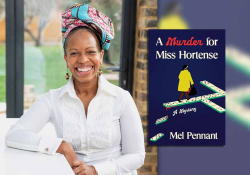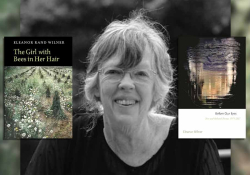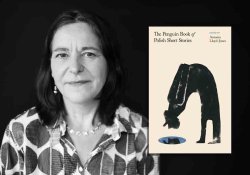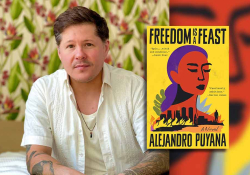The Abyss of Identity: A Conversation with Baret Magarian
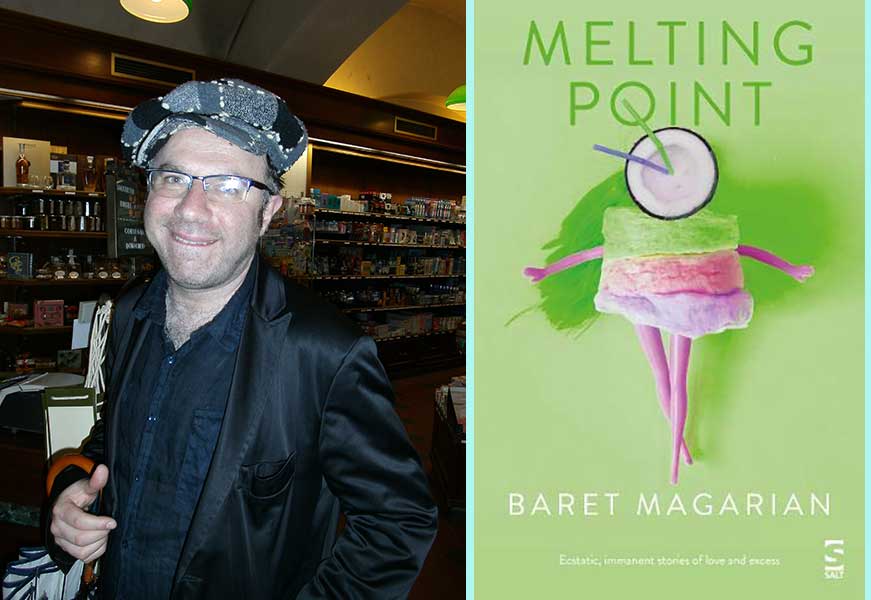
British Armenian writer Baret Magarian is the author of four books. His novel The Fabrications was hailed by the Times Literary Supplement, Kirkus, and the New Statesman as a novel of considerable originality and daring that addresses some of the key issues of our time, including the mass media and the power of spin and the PR machine. His latest book, Melting Point (Salt, 2019), is an eclectic, ambitious collection of fourteen stories, every one of which tackles a different setting, genre, and texture. In his afterword to the Italian edition, Jonathan Coe compares the stories to those of Kafka, Pessoa, and Calvino.
Jamie Mackay: The title of your latest collection, Melting Point, is a curious one. As readers we seem to enter the book framed by the end of something, an extremity or a limit of some kind. What did you hope to convey with it?
Baret Magarian: I’ve always liked the idea of melting. It’s something ambiguous, it’s a liberation, but it’s also a kind of death, a kind of finishing. If you melt a block of ice, the ice is somehow liberated, it’s a kind of freedom from a prison, the prison of the ice block. At the same time, it’s also a diminishing. The object will run away, become intangible, eventually evaporate. It’s not concrete anymore, it becomes water, and water cannot be grasped, picked up. In life I think one can melt, and one can become water. This is just one of the themes I look at in the book.
Mackay: For me it inherently conjured up images of the financial crash and, perhaps even more urgently, climate change. Throughout the book you seem to suggest that our system of politics, the very premises of our civilization, are melting along with the ice caps.
Magarian: I didn’t overtly think of it in those terms, but I think you’re right. In one of the stories, “Clock,” there’s a line that I rather like: “time concealed money and money eventually ruined time.” I think that’s almost where we’re at. Money has become so toxic and meaningless and kind of insanely abstract (in its vastness) that it’s now competing with the inscrutability and mysteriousness of time and eventually even destroying time. Money’s colossal power is reaching out to knock dents in the vastness of time. Money has outsoared its immediate context and become a cosmic force.
Then there’s “The Visitation,” which is about fishermen finding this hybrid, unidentified “thing” washed up on the beach. It’s a sort of Fellini-esque sea monster, almost like the one from the ending of La Dolce Vita, which was a half-influence here. . . . That story is also about the environmental mess we’re in, how we’re creating mutations of things that aren’t natural anymore. My monster becomes a reflection of that, of plastic and the sense that we don’t really know what’s under the water. We don’t know what the sea contains—it’s this immense chamber of the unknown. . . . It has become a hazy transcript, an unclear transmission . . .
Mackay: The sea and beaches come up two or three times as settings in the book. What’s their relevance?
Magarian: The sea is very important to me; it’s, in a sense, a departure point. For me it’s a transcendental place, where you can observe the moon controlling the tides and so on. It’s almost a bridge to other worlds and planets, though you can’t leave this one. I think it’s an elemental thing. We feel oddly grounded at sea, even though it’s all water. Obviously, the sea can be rather terrifying, and especially these days with tsunamis and such things. For me, though, the beach, where you can witness the sea, is basically positive. It’s a place in which we get away from the ordinary quotidian texture of life and potentially touch something else. In other words, it’s the closest we can get to the texture of eternity, to the divine, if you will.
Mackay: Your characters often dwell among ruins or shipwrecks; they find objects buried in the sand or things left to rust. Your beaches are almost transcendental, forcing humans to observe history itself, or even go beyond it—
Magarian: I completely agree. When you’re on an uncorrupted beach, you are in a sense going back in time, because you’re linking with something that has been around for centuries or millennia. It’s always been like that; it hasn’t been modified or culturally signposted. I’m talking here about places like Sri Lanka or Bermuda, where I was a few years ago. These places have presumably been like that for many years, or millennia, with their rocks and pristine water. This represents a kind of coming home for humans or animals. We need to accept our animalistic side, and when we’re in water that’s kind of obvious, it’s kind of in your face. Water is history and we have a link to that, and we’re in contact with it. The fishermen in “The Visitation” are in touch with this sense of water’s elemental quality—they have been honed, sharpened by their constant contact with water, the water that has been melted from ice, ages and centuries ago, the water that will melt away all illusions and dreams because there is nothing more real, more urgent, more pure than water.
Mackay: Another thing that defines the collection for me is the constant interplay between the sacred and profane. A lot of your characters are addicts, or possessed by sordid drives, but this is in no way in tension with what I suppose one might call your spirituality. A kind of enchanted reality is always there in your work, and your style seems very much about stripping away the mundane to reveal it.
Magarian: I don’t want that to be hitting someone over the head with a hammer, but I do want the transcendent to be there on a subtle level. The works of literature I really love or respond to do have an element of something poetic or magical. For example, I like the Brazilian writer Clarice Lispector. People used to say of her writing that it was like witchcraft, which in a sense is what I aspire to. This is one of the greatest accolades for a writer. Writing is magical, but it’s also a magic trick. You’re trying to hypnotize your reader. You’re sending people into a trance. I do believe that literature has to have some aspect of that, or at least needs to touch on something that isn’t about the trade and business of everyday living.
I like the Brazilian writer Clarice Lispector. People used to say of her writing that it was like witchcraft, which in a sense is what I aspire to. This is one of the greatest accolades for a writer.
Mackay: The collection is dizzying in its geographical ambition. You never know where it will go next. It’s exhilarating; you feel you’re on a world trip. At the same time, and I think this is a considerable achievement, you never lose a sense of the style. Was that a hard balance to get, between range and voice?
Magarian: I have to say this came about quite intuitively. Maybe it’s because I’m this person who is kind of wandering around all the time and doesn’t have a strong rootedness, or maybe it’s something else. The stories just manifested themselves in this strange way. I didn’t have a scheme. It wasn’t as if I said, Right, I must write a story in America, one in Greece, one in the UK. I have traveled to these places, so I didn’t just do it off my head or based on the Lonely Planet guide. But this was a natural approach for me. I was just interested in trying to write variegated and diverse stories with different settings, and I didn’t want to repeat myself.
It’s a lot, I think, about picking up on a nuance here and there, and then being able to just articulate that nuance, like someone’s dress or the way they smoke a cigarette or a certain violence in the air, or a certain atmosphere, or a certain cosmopolitan kind of texture. Like I said, writing is a trick in some ways. You don’t need to research Sri Lanka to write about a hotel in Tangalle, you just have to have contact with something that resonates with that context from within yourself, which you can then translate into writing. It’s primarily an emotion that allows you to write about those places; that’s what storytelling is. It’s not about information; it’s the emotional contact with a place that allows you to create something, I think.
It’s not about information; it’s the emotional contact with a place that allows you to create something.
Mackay: One obvious risk with what you’re saying is that you might end up relying on cheap stereotypes—the smell of a spice market as an endpoint in itself, if you know I mean. That you manage to avoid this on the whole is, I think, thanks to your characters, your subtle noting of details about human nature that go beyond the mere place or sense of difference. Were you afraid of that kind of superficiality?
Magarian: Yes, I was, but I just went with my gut. I’m still a bit worried with some of the stories, like, say, “The Opiate Eyes of the Buddha,” that people might think that’s an awful way to represent Sri Lanka. They might well say that, and with reason. But the experience of that particular story was based on a real event and almost happened to me. The hotel I was staying in was full of blood and broken glass, and I read about what had happened the day before in the local press. A woman was raped and a man murdered. It was very disturbing.
If you want to avoid cliché, I think you have to have something that’s more real and more connected and profound, which enables the thing to be sustained. Paul Bowles, who’s another influence on me, does this really well. He often tackles this gray zone between being a tourist-foreigner, a resident, and an actual native. He often plays with what is it to be all of these at the same time. That’s a fascinating area of human experience that is so kaleidoscopic. As people we’re always asking: Are we outside or inside? Our experiences kind of blend and fuse together, so at moments we are more foreign, other times more native. To me the whole world is going in that direction.
Melting Point is also about this gray area of who we are. Are we passing through, or are we like the wind, or is there something more grounded? That’s a question I’ve always grappled with. I worry that I have no fixed identity of my own, which is maybe why I like to write about such different places and am drawn to so many different points of view. Of course, that can be an advantage for a writer, necessary even, but it begs the question, Is identity therefore—ultimately—just an abyss and are writers sophisticated chameleons? I have often asked myself that question: Who am I beyond all the bits of culture and language that have clung to me like debris to honey?
I worry that I have no fixed identity of my own, which is maybe why I like to write about such different places and am drawn to so many different points of view.
Mackay: Several of the stories, particularly those outside of Europe, are quite violent. What was the function of that? How did you conceive of the parallels and differences when writing about “the West” and outside of it?
Magarian: One of the best examples of this is “The Rich and the Slaughtered.” It’s a disturbing tale about a child who has had his legs blown off. Really it’s about how certain areas of the world have become hell because of business, capitalism, war, and so on. The “otherness” is imbued in horror and tragedy and human deprivation and degradation. And that’s part of reality, too. I think a lot of writers today don’t seem to realize that there is a whole universe except for their little world, and it’s totally limited, I find. I wanted to show other facets of the non-middle-class experience. I’m not saying this is a social-realist book about working-class suffering or anything like that, but I do want to at least acknowledge that. In the book you’re either traveling and having this experience of revelation—like Kirsten in “The Watery Gowns”—or it’s just plain awful and can’t lead to anything epiphanic. There are a lot of worlds in the book that I’m pointing the camera to. One of the things I want to say is this: Look, life is incredibly complex and diverse, and for someone in India their problems are very different than those of someone in Piccadilly.
Mackay: Melting Point seems to me refreshingly unconcerned with the sometimes-insidious expectations of national canons. Writing about England, for example, often means engaging with strange forms of political turmoil, class and country houses, manners, or the countryside. Italian fiction is tied up with fascism and World War II and the mafia and these parts of the national myth. Do you think your literary philosophy liberates you from those constraints?
Magarian: I’m always trying to reinvent genres and surprise the reader here and try something fresh. I’m not the sort of writer who would want to be associated with these standard themes, or if I were to be associated with them I’d like to reinvent them or reexamine them anew. For me the best writing is writing that’s free of that kind of approach, that’s doing something that’s really so unbelievably original you can’t say what it is. By definition that means dealing with something that is without borders. I think I’ve always aspired to get out of the national thing and to get into something universal.
I want to write something that’s globally interesting, because that’s the opposite of parochial and of nationalistic and of Brexit and all that, which is where we’re all headed, which I think is really toxic.
Mackay: How do you feel about the term “global writer”? Is it one you’d feel comfortable embracing?
Magarian: I think it’s a great term. It sounds a bit self-important, perhaps. There might be the assumption that the person thinks they have global relevance. That could almost never be the case, but you’d want to aim for it, I think, even if you couldn’t achieve it. Personally, I want to write something that’s globally interesting, because that’s the opposite of parochial and of nationalistic and of Brexit and all that, which is where we’re all headed, which I think is really toxic. I’d like people to put aside their differences and concentrate more on what links us, though the problem with that is that I no longer know what links us actually because technology has totally redefined everything. I mean everything.
And it has blown open, cast into the public arena, the whole incredibly complex, recalcitrant realm of the private. The private has become the public for the first time in history but without any of the sobering, universal prisms that art and sociocultural filtering can guarantee and provide. This immense new body of information has been unleashed, and we have to somehow try and process it, make sense of it, decode it, neutralize it in some cases. As a result, people’s values, beliefs, personas have all been rendered infinitely more complex. That’s incredibly interesting and even inspirational in some ways, but it also renders the notion of ties and links and commonalities and shared aspirations somehow a little bit naïve or out of date. And that’s also partly why the political landscape has been so ravaged and deconstructed and redrawn, and is so out of joint. Because truth and all its incarnations have been utterly splintered and fragmented. The private world of opinion has contaminated the search for truth; one might even say replaced truth and melted it into something else.
July 2019
Baret Magarian is a British Armenian writer who has four published books, most recently the short-story collection Melting Point. His story “The Meltdown” appeared in the January 2016 issue of WLT.





